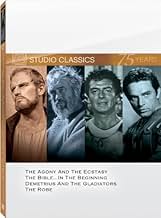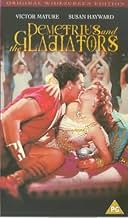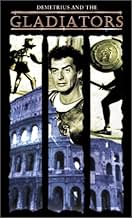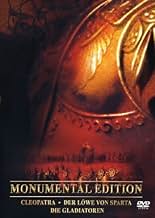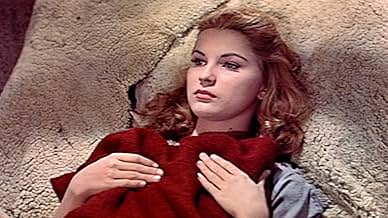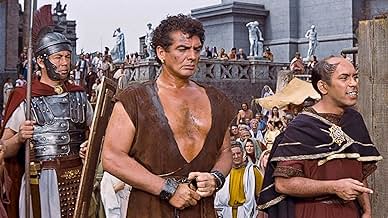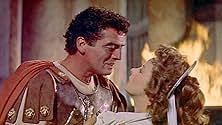Dans la Rome du premier siècle, l'esclave chrétien Démétrius est envoyé se battre dans l'arène des gladiateurs et l'empereur Caligula cherche la robe de Jésus pour ses prétendus pouvoirs mag... Tout lireDans la Rome du premier siècle, l'esclave chrétien Démétrius est envoyé se battre dans l'arène des gladiateurs et l'empereur Caligula cherche la robe de Jésus pour ses prétendus pouvoirs magiques.Dans la Rome du premier siècle, l'esclave chrétien Démétrius est envoyé se battre dans l'arène des gladiateurs et l'empereur Caligula cherche la robe de Jésus pour ses prétendus pouvoirs magiques.
- Réalisation
- Scénario
- Casting principal
- Soldier
- (non crédité)
- Gladiator
- (non crédité)
- Cousin
- (non crédité)
- Gladiator
- (non crédité)
- Varus
- (non crédité)
- Gladiator
- (non crédité)
- Guard-Escort of Prisoners
- (non crédité)
Avis à la une
Back in those days you really only saw movies once - with mum and dad at the local cinema on Friday night. But my memory wrapped around this film almost as if I had a rewind button inside my head. It was one of those big-screen epics that made an impression on me.
With your Roman Empire movies, your best bet is to set the story in the reign of one of the three mad emperors - Nero is tops, but Caligula and Commodus are the next best thing. Someone like Augustus with his stable, 40-year reign is just a little too sedate when it comes to drama - a bit like the Eisenhower era.
Set in Rome during the reign of Caligula, all Demetrius (Victor Mature) wants to do is hand over the robe of Jesus to Peter (Michael Rennie), and lead a quiet life as a potter. Instead he has his faith shaken, and ends up in the arena where he dispatches many opponents and a streak of tigers. Along the way his most dangerous enemy turns out to be Messalina (Susan Hayward), the wife of Caligula's uncle Claudius. It takes Peter and a good buddy from the arena, Glycon (William Marshall), to guide him back to the light.
Well that's the story; the script is there to keep the spectacular arena scenes apart, and clear the set for Jay Robinson's viperish and eye-poppingly campy interpretation of Caligula. Despite tigers, dancing girls, oiled muscles, nets, tridents and short swords, the movie would have been pretty heavy going without Jay.
Victor Mature is on screen for just about the whole movie and for the most part is either angry or anguished. I've always thought he was pretty good for a guy who once told a club, which did not accept actors as members, that he wasn't an actor and he had the reviews to prove it.
One actor who was perfect in his role was Richard Egan. He plays Dardanius, a gladiator with attitude, and he looks the part with more muscles and teeth than Burt Lancaster.
Susan Hayward gave Messalina some of the same medicine Jay Robinson gave Caligula; together they keep the movie from getting too serious. I love the way Messalina does a complete turnaround right at the end to wrap the whole thing up in about two minutes flat.
Debra Paget is beautiful. Michael Rennie has gravitas and William Marshall is imposing - two great voices in the one movie.
Although technical aspects weren't things I noticed much back in the 50's, I can now appreciate how Franz Waxman's score gave the film spirituality and depth. Waxman was a composer who contributed intelligent scores to every film he did without repeating himself.
I must admit I still have a soft spot for this film; the arena scenes alone are worth the price of admission.
Peter (Michael Rennie) gave Demetrius of Corinth (Victor Mature) their master's robe to keep for him As we all remember, Demetrius took the robe from the foot of the cross before Jesus died
By order of Caligula, 20 pieces of gold were authorized to pay for information concerning the robe that Jesus wore to the cross Defending Lucia (Debra Paget) from malicious attack of a Praetorian Decurion, Demetrius is caught and sentenced to train as gladiator in the Claudian school
Being fully a Christian entails having a commitment: Demetrius, obviously, is condemned to death because he can't take a man's life Puzzled by his religion, and fascinated by his magnificent physique, and wanting to find out if Demetrius will kill or not his opponent, Messalina asks to be put in the arena against the king of swordsmen the Nuban Glycon (William Marshall).
The dramatic moment of the film comes when Lucia (Debra Paget)Demetrius' sweetheartsneaks in and is attacked by Dardanius (Richard Egan) and other gladiators... His faith shaken, Demetrius makes several kills, renounces his god, and succumbs to Messalina's charms...
Susan Hayward looked gorgeous as the wicked Messalina The part, however, was not developed... It might have been an ideal role for this beloved actress... This was Hayward's second movie with the radiant Debra Paget, who was still considered a promising starlet, but, again, they were never together in a scene...
Future Academy Award winners Ernest Borgnine and Anne Bancroft had small parts... Michael Rennie and Jay Robinson were excellent in their respective roles... Julie Newmeyer was one of the dancing girls, long before she became Julie Newmar and played Howard's rival in "The Marriage-Go-Round."
"Demetrius and the Gladiators" is a lively, efficient sequel to "The Robe," with emphasis less on religiosity than on the brutality of the arena
The central character, Demetrius, is a former slave who, after assaulting a soldier who is molesting his girlfriend Lucia, is sentenced to fight in the arena as a gladiator. This causes him difficulties as he is a Christian whose moral code will not permit him to kill another man, even in self-defence. He survives, however, largely because he attracts the attention of Messalina, the wife of Claudius, uncle of the Emperor Caligula. Later, believing that Lucia has accidentally been killed by another gladiator, Demetrius renounces his Christian faith, and fights fiercely, killing the man he believes to have been responsible for her death and several others. His courage and skill with a sword lead to his being made a tribune in the Praetorian Guard, and he becomes Messalina's lover. As in "The Robe", the robe which Christ wore to His crucifixion plays an important part in the film; Caligula wants to get his hands on it because he believes that it has magical powers and that it will give him the secret of eternal life.
Several of the epics of this period combined, incongruously, an improving religious message with a good deal of eroticism, with much bare female flesh on display- examples include "Solomon and Sheba", "Esther and the King" and "Salome", where we get to see the famous dance of the seven veils, but it is made clear that, contrary to the Biblical version of the story, Rita Hayworth's character is in fact a virtuous heroine who only is flashing her legs in public in a desperate attempt to save John the Baptist from his fate. There are elements of this strange combination of godliness and sexiness in "Demetrius", but the sexiness is very much downplayed. Messalina's notorious promiscuity is alluded to rather than shown on screen, and the scene between the gladiators and the women brought in to entertain them may be an orgy, but it is a very decorous one. The film-makers were clearly more interested in the element of godliness, and, unlike some films of this type, "Demetrius" raises genuine moral issues about pacifism, non-violence and Christian forgiveness.
Demetrius himself is a man who goes through a crisis of faith and abandons his Christian beliefs in favour of an ethic based on revenge and worldly ambition. His conscience, however, is troubled, especially after he is reproached by his old friend St Peter. He is a more complex and interesting figure than many epic heroes, so it is unfortunate that the part was played by Victor Mature, an actor whose success often seemed to owe more to his ruggedly masculine good looks and his virile physique than to his acting technique. Susan Hayward (an actress who could often look bored and listless when asked to play roles that did not interest her) makes a weak Messalina. Neither give their worst performance (in Hayward's case that must surely have been "The Conqueror"), and Mature brings a certain rough sincerity to his part, but I felt that the film might have been improved with other actors in these roles.
Nevertheless, there was much I enjoyed about the film. Michael Rennie was appropriately dignified as Peter, played as a sort of ascetic philosopher, although I would agree with the reviewer who pointed out that it would be hard to imagine him ever working as a fisherman. I also liked William Marshall as Glycon, the former African king now forced to fight as a gladiator, who befriends Demetrius. ("Spartacus", a better film than "Demetrius" although it owes something to it, also features a sympathetic black gladiator who befriends the hero).
Jay Robinson, who played Caligula, has been criticised by some reviewers for overacting, although I must say I liked his performance. Historians have doubted whether the real Caligula was actually insane, although he was undoubtedly cruel and eccentric, but in the context of this film he is definitely presented as a lunatic, a man who has literally been driven mad by power to the point where he believes himself to be a god. (Not even Hitler went that far). There is an interesting contrast with a modern epic, "Gladiator", in which Joaquin Phoenix plays another tyrannical Roman Emperor, Commodus, as a basically weak and insecure young man. Although Phoenix's performance works well in the context of that particular film, the way the role of Caligula was written called for something quite different- the sort of ranting, over-the-top performance which might be unfashionable now but would have been less controversial in the fifties.
Although the standard of the acting is mixed, I generally enjoyed the film. It does not reach the standard of the really great epics, such as "Spartacus" or "Ben-Hur", but it works well on the level of spectacle, with fine sets and costumes and some exciting scenes of gladiatorial combat, and has a more intelligent script than many epics. 7/10
Victor Mature as Demetrius, Michael Rennie as St. Peter, and Jay Robinson as Caligula continue their roles from The Robe. An original screenplay was done with these characters already familiar to the public from the film and from the beloved Lloyd C. Douglas novel. The film starts with a clip from the end of The Robe where Caligula has condemned Richard Burton and Jean Simmons to execution. As they leave Simmons hands Jesus's robe to an unnamed extra and says it's for the big fisherman.
Of course it gets into Michael Rennie's hands, but Jay Robinson has heard rumors about this magical robe the Christians possess. Nobody can get an obsession like Robinson so he finds Demetrius who's now got a girlfriend in Debra Paget. He's sold back into slavery this time as a gladiator.
Mature who was a supporting character in The Robe takes center stage here. He goes through quite a test of faith on many levels, including an affair with the notorious Messalina played by Susan Hayward. She's appropriately tempting and Mature's flesh is definitely weak here if not in the arena.
Michael Rennie who has always played aesthetic upper class gentlemen is really miscast as the rugged outdoor St. Peter. He does what he can with the part, but my conception of St. Peter at various times of his life is better realized by Howard Keel in The Big Fisherman and Finlay Currie in Quo Vadis. These two look like they made a living outdoors, I could never see Rennie out on a commercial fishing boat.
Of course Robinson continues with his well received portrayal of Caligula from The Robe. The difference is that in The Robe he was the spoiled heir to the throne. In Demetrius and the Gladiators, Robinson truly descends into madness as he starts believing he's divine.
Another outstanding performance is William Marshall as Glycon, the gladiator/slave from Ethiopia. Marshall had a tremendous speaking voice, think James Earl Jones and Marshall makes him sound like a soprano. Had he come along a few years later, Marshall would have had the career Mr. Jones had. He's probably best remembered today for both the Blacula films and in an episode of the original Star Trek series as Dr. Dengstom who invents a computer to run the Enterprise.
Some of this ground was covered better in the highly rated I Claudius series from the BBC. But that does not diminish Demetrius and the Gladiators in quality. Both should be seen and evaluated side by side on their own separate merits.
When Twentieth Century-Fox filmed "The Robe", they already knew that it would be followed up by "Demetrius and the Gladiators". In fact, the movies were filmed like one huge film and then separated into two as the studio was THAT confident that "The Robe" would be a big hit--which it was. And, for that matter, so was its sequel. Fortunately, you can watch either without watching the other.
The film begins with a clip from the previous film--just before the two main characters (Richard Burton and Jean Simmons) were executed. Soon you learn that the Apostle Peter and his followers (including Demetrius--Victor Mature) are the keepers of the robe that Jesus wore to the cross. Oddly, however, the Emperor Caligula is very fascinated by the robe and insists he must have it. When Demetrius tries to hide it, he's sentenced by this loony emperor to become a gladiator--a sure death since Demetrius has vowed never to fight now that he's become a Christian. However, the lure sexy Messalina (Susan Hayward) and his own desire to live make it difficult, if not impossible, to fulfill this oath. What's next? See for yourself.
There's no doubt about it--this film is a spectacle. It has huge scenes, huge gladiatorial fights and lots of beautiful sets and costumes. While it's not a fantastic film, the action is there and the film is fascinating. Part of this is due to the supporting performances. William Marshall shows what a wonderfully unsung actor he was. Had he been born later, his wonderful voice and acting skills would have made him a top star--something not possible for a black actor during this age. Additionally, while Jay Robinson's version of Caligula is not in the least bit subtle, it IS very entertaining and fun to watch. All in all, a decent film that is far better than I'd suspected.
UPDATE: Since this review, I've finally seen the precursor, "The Robe", and was surprised just how bad it was compared to "Demetrius and the Gladiators. It's an odd example of a film whose sequel was better--much better.
Le saviez-vous
- AnecdotesThe set of the Christian neighborhood in Rome has previously been used in La tunique (1953) (of which this film is the sequel) as the village of Cana. We can easily recognize the well with old broken columns.
- GaffesWhilst Caligula (Jay Robinson) is talking to Claudius and Messalina about the death of Marcellus and Diana, he draws a dagger and plays with Claudius by threatening to stab him with it. When he puts it back in its sheath, sheath and dagger inadvertently turn upside down sticking out at an odd angle and irritating Jay Robinson, who tries twice and finally rights the sheath at his waist.
- Citations
Demetrius: We traveled here together from Galilee, persuading people to give up their lives for a beautiful dream.
[he attempts to hand a goblet of wine to Peter]
Demetrius: Take it Peter. It's real... hot spiced, with cinnamon and cloves.
[chuckles and looks towards Messalina]
Demetrius: Did you know that Jesus could turn water into wine? And that was only one of his tricks.
Peter: Yes, only one. Anything that was base, He could make noble. He found a leper and made him clean. He found death and He made life. He found you a slave, and He made you free.
Demetrius: Get out!
Peter: And now you've won a great victory over Him, haven't you tribune ? You've made yourself a slave again.
- ConnexionsFeatured in Miss Cobaye (1992)
Meilleurs choix
- How long is Demetrius and the Gladiators?Alimenté par Alexa
Détails
Box-office
- Budget
- 4 500 000 $US (estimé)
- Montant brut mondial
- 11 911 $US
- Durée
- 1h 41min(101 min)
- Rapport de forme
- 2.55 : 1


